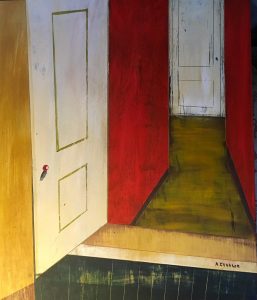November 27, 2017
By Arthur H. Gunther III
thecolumnrule.com
Doors can hold fascination because they are portals and keys to the ordinary things we do each day, like leaving the house or coming home and because they are metaphors for life, such as leaving a job or coming into a new situation. No matter what, if the door closes, so does something else. If it opens, so does something else.
A door can also be likened to emotion. A stuck door, one you struggle with as you open it, can trigger reflection about ongoing difficulty at work, or in a relationship. A door that always closes smoothly may be an analogy for a friend or loved one who is
dependable.
A series of doors can be a road map for a busy day, with each door closing symbolic of yet another task completed. If they all stick, maybe you should go back to bed.
Then there is the hallway, before the door, after it. Is it long? Is it bright or dark? What color is it, and does that sometimes set the day’s mood? Are there family pictures that remind you of what’s important?
How about the lock? Do you recall other doors in your youth with similar locks and how they clicked when a parent turned the
key?
Is the door knob shiny or loose or antique? How reassuring is it to grasp it, and is that a metaphor for any other anchor in your life?
Bet some of you won’t just sail through the next door you see.
The writer is a retired newspaperman. ahgunther@yahoo.com


